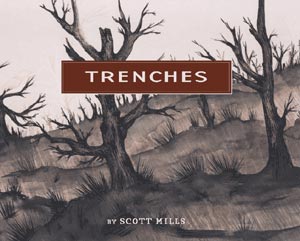 by Scott Mills
by Scott MillsI've been very tempted a couple of times over the years to purchase this 2002 graphic novel
It Was the War of the Trenches
Lloyd is a nervous, gentle individual, while his brother is loud, brash, given to impulse, and irreverent. Davey is often dismissive of Lloyd. Hemmingway, on the other hand, is meant to be the picture of the British officer, keeping a stiff upper lip, dispensing platitudes, and yet standing by his men.
Now, I've studied the First World War, so perhaps the discrepancies in historical fact and interpretation are more jarring to me than to a casual reader, but there are a few things that I felt Mills got absolutely wrong with this book, and they kept me from enjoying them:
1. Hemmingway doesn't seem to have a rank. Davey calls him Officer Hemmingway, like he's a cop.
2. Davey takes out a stationary flamethrower that looks like a machine gun (it's hard to tell with Mills's art). What would be the point of a stationary flamethrower? I've never come across any accounts of the German's using them.
3. The chaps undergo what is supposed to be the first gas attack of the war. The story makes it seem like the gas was coming in shells, an innovation that didn't come along until later. Also, Hemmingway gets a good few lungfuls of the gas and collapses. Luckily, he's perfectly fine after a little rest. That would not be possible.
4. Also, I'm not a doctor, but I'm pretty sure that someone who has had their leg ripped off would bleed out long before they'd be able to hobble back to their lines, especially since no one even bothers to tourniquet the wound. And this happens twice!
5. Class distinctions were pretty strict at this time. I doubt that Hemmingway would have had his former subordinates over for Christmas dinner after the war, especially the two women that one of the soldiers sleeps with at the same time.
Mills acknowledges one of John Keegan's books as reference material. I'm thinking maybe he only looked at the illustrations. Were the story of the two brother's and their relationship more compelling, I'd be able to overlook the lack of understanding of the setting, but since that story is not worth spending time on, I can't. Avoid this one, even at $2.

No comments:
Post a Comment